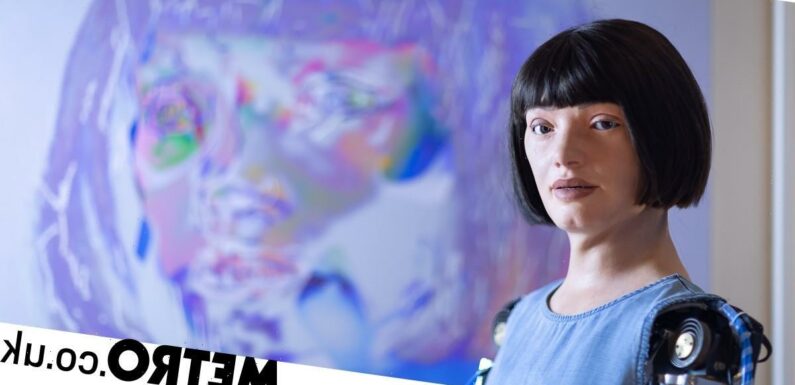
An ‘ultra-realistic’ robot will become the first of its kind to address the House of Lords this week.
Robot painter Ai-Da will appear before the House of Lords Communications and Digital Committee tomorrow afternoon.
The robot will be there to give a speech and answer questions about the threat posed by artificial intelligence to the creative industries.
Ai-Da – named after Ada Lovelace – will give evidence as part of an inquiry into the future of the arts. It was devised in Oxford by Aidan Meller, a specialist in modern and contemporary art, before being built in Cornwall by Engineered Arts and programmed internationally.
The robot has cameras in its eyes and uses a specially designed artificial intelligence model to formulate answers to questions.
Like a really, really advanced version of Siri.
Ai-Da previously painted a portrait of Queen Elizabeth II ahead of her Platinum Jubilee.
To view this video please enable JavaScript, and consider upgrading to a webbrowser thatsupports HTML5video
‘Her abilities as an artist brings into question the foundations of the art world and the creative industries,’ Mr Meller said.
A robotic arm lets Ai-Da turn digital formations into physical drawings and paintings.
The rather uncanny-looking robot has human-like skin, eyes and hair, and some truly unique capabilities, including using computer memory to visualise her canvas.
‘Ai-Da’s maiden speech at the House of Lords will help us to understand how an AI robot sees the world and what that means for the future of creativity.’
The robot’s speech at the House of Lords will explore the role of machine learning, machine creativity and AI in the UK’s creative industries.
Despite being a robot, Ai-Da supposedly has her own artistic temperament and is growing in confidence, exploring new artistic techniques and learning as she goes.
Her work includes collaborative paintings, sculptures and performance art. As a work of conceptual art herself, Ai-Da encourages her human counterparts to reconsider our self-perception through the lens of a humanoid robot.
Artists, like plenty of others, are a little concerned about the possibility of artificial intelligence replacing humans in the future.
Before he died, Professor Stephen Hawking said he did not see a fundamental difference between a what a human brain and a computer can achieve, so it follows that at some point the machines can become better than us.
‘The real risk with AI isn’t malice but competence,’ he said.
‘A superintelligent AI will be extremely good at accomplishing its goals, and if those goals aren’t aligned with ours, we’re in trouble.’
Source: Read Full Article

